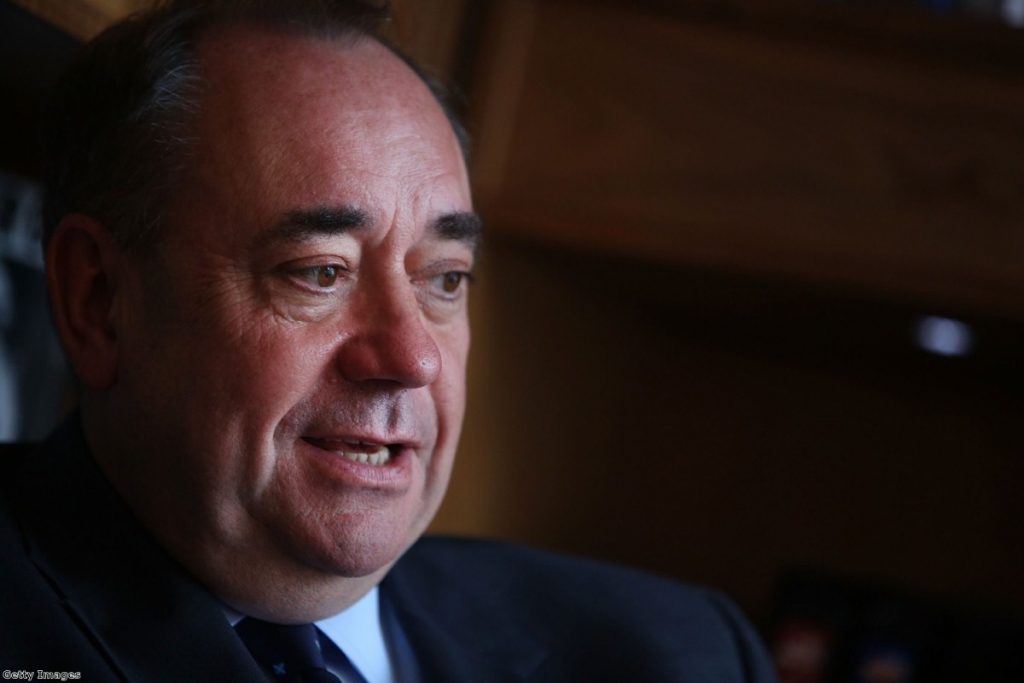Alex Salmond: England can govern itself, too
Alex Salmond has given his backing to proposals for dramatic devolution of powers to England after the Scottish independence referendum, telling Politics.co.uk he has "great confidence" the English can govern themselves.
The Scottish first minister, speaking days before voters go to the polls on Thursday to decide whether Scotland will leave the UK for good, suggested measures extending devolution to Scotland could be matched south of the border.
"I think that a lot of people have doubts about self-government, whether a nation can rise to the challenge of governing itself. But when I hear that question I say to myself I've got great confidence in the people of England," he said.
"I think England is very capable of self-government. I don't think people should question its ability to move forwards as a country. It has a fantastic literary heritage, it has tremendous democratic intellect. It has a great cultural hinterland."


Salmond's comments will infuriate those in Westminster preparing for more Scottish devolution in a bid to sway wavering voters in Thursday's referendum.
But they may be welcomed by some in England, like the Local Government Association, who are calling for any further 'devo-max' settlement to be matched in England's regions.
Deputy prime minister Nick Clegg has already voiced his support for a radical transferral of powers to England's regions in a bid to help them "stand on their own feet".
Salmond, voicing his own support for the accelerated decentralisation of power away from London, appeared to lay the foundations for a new 'devo-max' settlement in the event of a 'No' vote.
He added: "Please, please don't suggest, in the way of [David] Cameron or [Ed] Miliband, that somehow the country which produced Adam Smith and Robert Burns is incapable of governing its own affairs successfully.
"Because the people of Scotland don't want to hear that anymore. They want to hear the positive message of inspiration to say let's put Scotland's future into Scotland's hands."
Salmond revealed that David Cameron had made clear in their talks on setting up the terms of the referendum that "he didn't want to lose Scotland as George III lost America".
"Leave to one side that Scotland is an ancient nation, it's not a property to be lost or found," he said.
"The reason he did that is he believed that with a binary choice, yes or no, it was in the bag for Westminster. That's why he refused that choice [of adding devo-max].
"Now of course, things have turned against them, the positive campaign being run by the Yes side has raised so much ground, then all of a sudden we have two things: an increase in scaremongering and a calling-in of big organisations to help them out, and then secondly we have the last-minute desperate visits to shore things up. It's just too little too late, and the positive message will prevail."
Yesterday David Cameron spoke in Aberdeen to make clear to 'Yes' supporters who believe independence could be reversed that there is "no going back".
The prime minister said: "If Scotland votes yes, the UK will split, and we will go our separate ways forever.
"When people vote on Thursday they are not just voting for themselves, but for their children and grandchildren and the generations beyond."
Salmond responded: "Yes does mean yes, I agree with David Cameron absolutely on that."
He cited the many countries who competed in this summer's Glasgow Commonwealth Games who had not sought to reverse their independence over the last 50 years as proof that Scotland would not need to do the same.
"They're not going back because they're flourishing and working as independent countries. Nobody goes back," he insisted.
"This is a once-in-a-lifetime opportunity, and the evidence is that more and more people are wanting to put Scotland's future into Scotland's hands."

